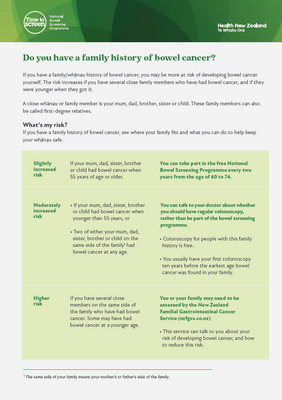Do you have a family history of bowel cancer? 58 to 74 years - English - HE2736

The full resource:
Do you have a family history of bowel cancer?
If you have a family/whānau history of bowel cancer, you may be more at risk of developing bowel cancer yourself. The risk increases if you have several close family members who have had bowel cancer, and if they were younger when they got it.
A close whānau or family member is your mum, dad, brother, sister or child. These family members can also be called first-degree relatives.
What’s my risk?
If you have a family history of bowel cancer, see where your family fits and what you can do to help keep your whānau safe.
Slightly increased risk
If your mum, dad, sister, brother or child had bowel cancer when 55 years of age or older.
You can take part in the free National Bowel Screening Programme every two years from the age of 58 to 74.
Moderately increased risk
-
- If your mum, dad, sister, brother or child had bowel cancer when younger than 55 years, or
- Two of either your mum, dad, sister, brother or child on the same side of the family1 had bowel cancer at any age.
You can talk to your doctor about whether you should have regular colonoscopy, rather than be part of the bowel screening programme.
-
- Colonoscopy for people with this family history is free.
- You usually have your first colonoscopy ten years before the earliest age bowel cancer was found in your family.
Higher risk
If you have several close members on the same side of the family who have had bowel cancer. Some may have had bowel cancer at a younger age.
You or your family may need to be assessed by the New Zealand Familial Gastrointestinal Cancer Service (nzfgcs.co.nz)
-
- This service can talk to you about your risk of developing bowel cancer, and how to reduce this risk.
1. The same side of your family means your mother’s or father’s side of the family.
Talk to your doctor if you think you may be at higher risk.
- You may be advised to have regular colonoscopy rather than be part of the National Bowel Screening Programme. During a colonoscopy, a specially trained doctor or nurse looks at the lining of your large bowel using a very small camera.
- You may also be referred to the NZ Familial Gastrointestinal Cancer Service for assessment.
If you receive a bowel screening kit while seeking advice about your family/whānau risk, make sure you do it and send it back.
See your doctor straight away if you have symptoms of bowel cancer such as:
- a change in your normal bowel habits that continues for several weeks
- blood in your bowel motion (poo).
For more information:
- Talk to your doctor or your local bowel screening team.
- Go to timetobowelscreen.nz to find out about the free National Bowel Screening Programme.
- Call 0800 924 432
- Email info@bowelscreening.health.nz